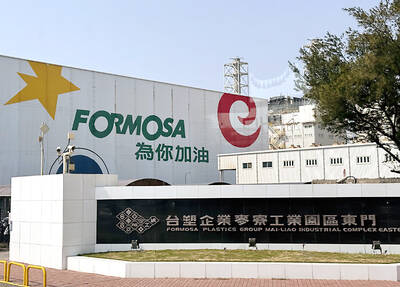Powerchip Semiconductor Corp (力晶半導體), the nation’s biggest computer memory chipmaker, yesterday said it may unveil its own industry consolidation plan with Japanese partner Elpida Memory Inc as early as next week.
Powerchip was not satisfied with a proposal made by the government to help DRAM makers ride through the industry’s severest downturn yet. The government proposed forming a state-funded firm, Taiwan Memory Co (TMC, 台灣記憶體公司).
Taiwan’s ailing makers of DRAM computer memory chips had been pinning hope on a capital injection from the government through the new company to help them resolve pressing financial difficulties.
But TMC head John Hsuan (宣明智), in a reversal of the original blueprint laid out by the government, said the new chipmaker would not put consolidation efforts high on its list of priorities, adding that memory chip companies would have to solve their financial problems by themselves.
No merger and acquisition deals or relief funds would be involved in the formation of the new company, Hsuan said.
Without support from the government, Powerchip will instead “speed up our consolidation efforts with Elpida,” spokesman Eric Tan (譚仲民) said on the phone.
“Creating TMC will not be of any help to the ailing DRAM industry. It is just another DRAM firm in competition with existing players,” Tan said.
Powerchip chairman Frank Huang (黃崇仁) told Unique Satellite TV (非凡電視) that domestic DRAM makers were struggling to survive the economic turndown because of oversupply and shrinking demand.
TMC would only exacerbate the situation and intensify competition, Huang said.
Huang was scheduled to meet high-ranking executives from Elpida next week for detailed discussions about a consolidation plan drafted earlier, Tan said.
The companies may retain the original consolidation plan, seeking to integrate some domestic DRAM makers into their joint venture, Rexchip Electronics Inc (瑞晶電子) in Taichung, which makes chips at cost-efficient 12-inch fabs with Elpida’s technology, Tan said.
Powerchip and Elpida submitted the consolidation and bailout plan to the Ministry of Economic Affairs in late December, but the plan was rejected.
Shares of the nation’s top three DRAM makers, Powerchip, Nanya Technology Corp (南亞科技) and ProMOS Technologies Inc (茂德科技), yesterday fell 6.4 percent, 2.3 percent and 6.3 percent to NT$3.33, NT$5.82 and NT$1.04, respectively.

EXTRATERRITORIAL REACH: China extended its legal jurisdiction to ban some dual-use goods of Chinese origin from being sold to the US, even by third countries Beijing has set out to extend its domestic laws across international borders with a ban on selling some goods to the US that applies to companies both inside and outside China. The new export control rules are China’s first attempt to replicate the extraterritorial reach of US and European sanctions by covering Chinese products or goods with Chinese parts in them. In an announcement this week, China declared it is banning the sale of dual-use items to the US military and also the export to the US of materials such as gallium and germanium. Companies and people overseas would be subject to

Taiwan Semiconductor Manufacturing Co (TSMC, 台積電) founder Morris Chang (張忠謀) yesterday said that Intel Corp would find itself in the same predicament as it did four years ago if its board does not come up with a core business strategy. Chang made the remarks in response to reporters’ questions about the ailing US chipmaker, once an archrival of TSMC, during a news conference in Taipei for the launch of the second volume of his autobiography. Intel unexpectedly announced the immediate retirement of former chief executive officer Pat Gelsinger last week, ending his nearly four-year tenure and ending his attempts to revive the

WORLD DOMINATION: TSMC’s lead over second-placed Samsung has grown as the latter faces increased Chinese competition and the end of clients’ product life cycles Taiwan Semiconductor Manufacturing Co (TSMC, 台積電) retained the No. 1 title in the global pure-play wafer foundry business in the third quarter of this year, seeing its market share growing to 64.9 percent to leave South Korea’s Samsung Electronics Co, the No. 2 supplier, further behind, Taipei-based TrendForce Corp (集邦科技) said in a report. TSMC posted US$23.53 billion in sales in the July-September period, up 13.0 percent from a quarter earlier, which boosted its market share to 64.9 percent, up from 62.3 percent in the second quarter, the report issued on Monday last week showed. TSMC benefited from the debut of flagship

TENSE TIMES: Formosa Plastics sees uncertainty surrounding the incoming Trump administration in the US, geopolitical tensions and China’s faltering economy Formosa Plastics Group (台塑集團), Taiwan’s largest industrial conglomerate, yesterday posted overall revenue of NT$118.61 billion (US$3.66 billion) for last month, marking a 7.2 percent rise from October, but a 2.5 percent fall from one year earlier. The group has mixed views about its business outlook for the current quarter and beyond, as uncertainty builds over the US power transition and geopolitical tensions. Formosa Plastics Corp (台灣塑膠), a vertically integrated supplier of plastic resins and petrochemicals, reported a monthly uptick of 15.3 percent in its revenue to NT$18.15 billion, as Typhoon Kong-rey postponed partial shipments slated for October and last month, it said. The